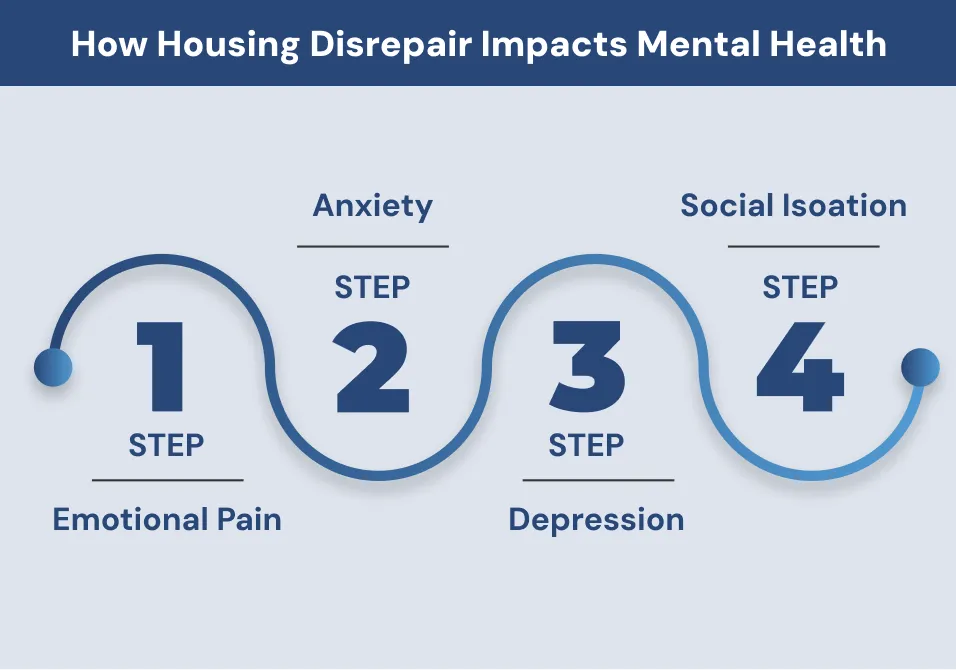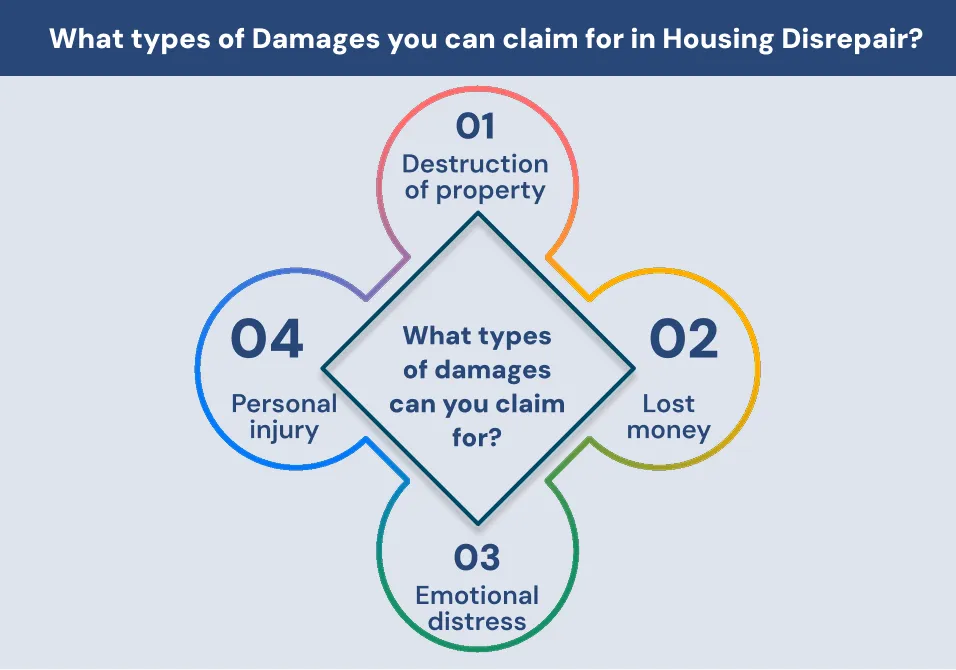TABLE OF CONTENT
Substandard housing may result in your mental health being affected. An inconvenience like mould or leaks, or dampness, is not only a problem on its own. When housing is in disrepair, it also causes anguish physically and mentally. If your home is in bad shape, Mental Health Housing Rights UK allow you to file a case. You can talk to a lawyer and seek their help to claim the damages. This blog will cover important information about housing and mental health issues. You will also learn the steps to file the claim.
What is Housing Disrepair
Housing disrepair means the state of a house that is not suitable for you to live in. If a landlord is not fixing the issues, you can file a claim regarding housing and mental health.
Reasons for Poor Housing Conditions
There are many reasons that intertwine housing and mental health. They happen when landlords fail to keep up with repairs. Common among the required repairs are:
- Broken pipes
- Damp and leaks
- Cracked windows
These can not only make you physically sick. They can harm your mental health too.
Connection between Poor Housing and Mental Health
Housing and mental health are often tied. Most of the poor housing aspects contribute to issues of mental health. For instance, if there is lead in your house there can be neurological damage. In children, lead can cause ADHD. Housing disrepair can also cause housing instability. This instability is also linked to poor mental health. Besides the house, landlords causing emotional distress in the UK is another factor. They can refuse repairs, cause delays, ignore the problem, etc. . This adds on to the stress of the disrepair.
Pevalin et al. explained the impact of persistent poor housing conditions on mental health as follows:
“Poor housing conditions also affect mental health. People living in housing with more problems have a greater likelihood of experiencing mental ill health while physical improvements to housing improves mental health”
Learn more about Mental Health Patients Rights in the UK.
How Housing Disrepair Impacts Mental Health
Here are the key ways through which housing disrepair leads to mental health issues:
Emotional pain:
If your house owner is careless, it may cause you emotional distress. An example of this would be their refusal to make the house habitable. It can be on purpose or by ignorance, but it can cause you emotional pain. Disrepairs also contribute to emotional pain in the following ways:
-
Trouble sleeping
Broken windows and pipes can increase noise. As a result, you may not sleep properly. Now, if you have been stressed, you need a good night’s sleep. These issues can prohibit that. Hence, they increase emotional pain.
-
Stressing out
If your house, the place of your comfort, is not in good shape, you’ll be very stressed. If not sorted out early, the stress of these issues can lead to more mental health issues.
-
Feeling overburdened
You may feel the burden of fixing all this. The stress of the problems, coupled with this feeling, can overwhelm you.
Housing and mental health are, thus, closely tied.

Anxiety:
Housing disrepair can cause you to be anxious all the time. Your worry can stem from the condition of your house or the landlord delaying repairs. For instance, you may feel insecure and uncertain if the door locks are not working.
If you have kids or sick family members, you’ll keep worrying about the disrepair affecting them. Faulty heating, for instance, could have adverse effects on them. So, if your heating is not working, you would naturally be anxious at all times. All these factors increase anxiety.
Explore more: What is Generalised Anxiety Disorder UK?
Depression:
You might feel worthless and ignored if you live in a house that is to be repaired. The process of complaining again and again can lead you to feel helpless. These feelings can ultimately make you depressed.
Social Isolation:
Disrepair affects the presentation of the house. As a result, you might feel shame in inviting friends and family over. This leads to a feeling of being left out of traditions, functions and gatherings. You might feel lonely and withdraw socially.
Effect of Poor Housing on Existing Mental Health Issues
Housing disrepair poses more risks to people who already have mental conditions. Tenants with health issues might not be able to cope with such issues like damp or broken windows. Such issues may worsen the situation and contribute to stress. This is why knowing your mental health housing rights in the UK is so important.
In other instances, the land owners might evict the tenants who are facing mental problems.. But evicting a tenant with mental health issues in the UK is not simple. Vulnerable tenants are guarded by laws and landlords have to adhere to proper procedures when addressing tenants
How to Get Mental Health Housing Rights
You should know about mental health housing rights in the UK. The law ensures that you have the right to live in safe spaces. The Homes Act 2018 makes sure that your house is fit to be lived in. If not, and you have complained of housing and mental health already, you can make a housing disrepair claim.
Local councils are also in charge of managing dangers in council housing. However, delays and other issues often slow down prompt responses.
Steps To Take After Being Affected by Housing Disrepair
Before you claim housing and mental health-related adverse effects, you need to collect proof and understand the laws. Here’s what to do:
- Snap photos or videos of any damage, mould, or dampness.
- Keep a log of calls with your landlord.
- Tell your landlord or housing group in writing about the problem.
- If your landlord won’t make repairs, reach out to a lawyer who deals with housing. He can help you fight for your rights.
- Make sure you understand your housing rights under UK law.
If your landlord refuses to fix the home, you may be able to ask for compensation for your housing and mental health. Here is what to do next:
Suing for Emotional Damage
If poor housing conditions have hurt your health, you have the right to claim emotional distress. Suing your landlord for mental health housing rights UK is possible if disrepair is causing harm. If a landlord ignores repeated calls to fix mould that worsens your anxiety, you may have grounds for a claim.
A lawyer can help you with the legal steps and get you compensation for the distress caused. If poor housing is hurting your mental health, legal help is available. You can get housing and mental health-related reports to strengthen your case.
Know more about psychological health injury claims here.
What Is the Compensation You Can Claim?
There are several factors which will determine the amount you can claim in a housing and mental health case. Here are a few main factors:
- The extent of the disrepair
- The length of time it has been neglected
- The impact it has had on your life, mental and physical health
What types of things can you claim for?
You can claim the following damages including the mental health housing rights UK:
1. Destruction of property
You can claim this when your furniture or clothes have been destroyed by mould.
2. Lost money
This means spending extra money on the house, such as being forced to pay more in terms of your heating bills due to a faulty heating system.
3. Emotional distress
in case the situation has led you to be stressed, anxious, or even depressed, you can claim reparations.
4. Personal injury
If the disrepair has caused you to be physically or mentally unwell, personal injury laws apply.
Your lawyer can find these damages from your housing and mental health-related report and act accordingly.

The amount you can claim
The amount that you can claim depends on how severe the damage was. Here is a rough estimate of how much money can be claimed based on different levels of damage:
- If your damage was less, i.e., no major damages were done, you may receive up to 750 -2500 pounds.
- If the damage was moderate, i.e., it had more pronounced effects on your life, you would receive between 2500 -6000 pounds.
- For severe damages that had significant effects, particularly on your mental health, you might receive up to 6000 pounds.
The exact amount you can claim depends on your case. Your lawyer considers all the relevant factors and then files the housing and mental health claim accordingly.
Housing disrepair and mental health: A case study
This case had public housing through the Housing Council. This tenant had been reporting frequent problems of water pouring into her unit. It led to water dripping through light fittings, creating a serious electrical and fire safety hazard. The landlord failed to take any action even at the time when it became apparent that this was detrimental. This called for a housing and mental health-related claim.
Impact on Client:
The pregnancy of the tenant aggravated the physical and emotional impact of the court dispute. This meant that she had to occupy a possibly life-threatening environment that was very stressful and worrying. Endless leaking rendered parts of the building unsafe and unlivable. Her conditions of housing and mental health were both affected.
Time of Distress:
Leaks and associated risks remained unresolved for 6 years, which was unacceptable.
Legal Proceedings:
This matter was settled pre-issue, without the necessity for official court proceedings. This is typically an indication of how strong the claim is and how urgent the situation is.
Compensation:
Here is the division of the compensation amount that the client won:
| Compensation | Costs |
|---|---|
| Damages Awarded to Client | £8,600 |
| Estimated Cost of Repairs | £1,910 |
| Legal Costs Claimed | £8,279.76 |
| Legal Costs Recovered | £6,500 |
The case highlights the serious consequences of unfinished repairs in social housing, particularly when dealing with vulnerable tenants. The damages granted were in consideration of the length of time the place was in disrepair, the unsafe conditions in which they had to live, and the emotional suffering.
Get help from Concise Medico
Living in a place with leaks and broken fixtures can harm your health. It can lead you towards housing and mental health problems. You should know the housing rights that the UK government provides to its people. You can get compensation through a disrepair claim if your landlord won’t act. For that, you need a housing disrepair report. At Concise Medico, we make sure that the report contains all the relevant details. With us, your report is accurate and to the point.
Contact us for any queries.
FAQs
Substandard housing may result in your mental health being affected. An inconvenience like mould or leaks, or dampness, is not only a problem on its own. When housing is in disrepair, it also causes anguish physically and mentally. If your home is in bad shape, Mental Health Housing Rights UK allow you to file a case. You can talk to a lawyer and seek their help to claim the damages. This blog will cover important information about housing and mental health issues. You will also learn the steps to file the claim.
What is Housing Disrepair
Housing disrepair means the state of a house that is not suitable for you to live in. If a landlord is not fixing the issues, you can file a claim regarding housing and mental health.
Reasons for Poor Housing Conditions
There are many reasons that intertwine housing and mental health. They happen when landlords fail to keep up with repairs. Common among the required repairs are:
- Broken pipes
- Damp and leaks
- Cracked windows
These can not only make you physically sick. They can harm your mental health too.
Connection between Poor Housing and Mental Health
Housing and mental health are often tied. Most of the poor housing aspects contribute to issues of mental health. For instance, if there is lead in your house there can be neurological damage. In children, lead can cause ADHD. Housing disrepair can also cause housing instability. This instability is also linked to poor mental health. Besides the house, landlords causing emotional distress in the UK is another factor. They can refuse repairs, cause delays, ignore the problem, etc. . This adds on to the stress of the disrepair.
Pevalin et al. explained the impact of persistent poor housing conditions on mental health as follows:
“Poor housing conditions also affect mental health. People living in housing with more problems have a greater likelihood of experiencing mental ill health while physical improvements to housing improves mental health”
Learn more about Mental Health Patients Rights in the UK.
How Housing Disrepair Impacts Mental Health
Here are the key ways through which housing disrepair leads to mental health issues:
Emotional pain:
If your house owner is careless, it may cause you emotional distress. An example of this would be their refusal to make the house habitable. It can be on purpose or by ignorance, but it can cause you emotional pain. Disrepairs also contribute to emotional pain in the following ways:
-
Trouble sleeping
Broken windows and pipes can increase noise. As a result, you may not sleep properly. Now, if you have been stressed, you need a good night’s sleep. These issues can prohibit that. Hence, they increase emotional pain.
-
Stressing out
If your house, the place of your comfort, is not in good shape, you’ll be very stressed. If not sorted out early, the stress of these issues can lead to more mental health issues.
-
Feeling overburdened
You may feel the burden of fixing all this. The stress of the problems, coupled with this feeling, can overwhelm you.
Housing and mental health are, thus, closely tied.

Anxiety:
Housing disrepair can cause you to be anxious all the time. Your worry can stem from the condition of your house or the landlord delaying repairs. For instance, you may feel insecure and uncertain if the door locks are not working.
If you have kids or sick family members, you’ll keep worrying about the disrepair affecting them. Faulty heating, for instance, could have adverse effects on them. So, if your heating is not working, you would naturally be anxious at all times. All these factors increase anxiety.
Explore more: What is Generalised Anxiety Disorder UK?
Depression:
You might feel worthless and ignored if you live in a house that is to be repaired. The process of complaining again and again can lead you to feel helpless. These feelings can ultimately make you depressed.
Social Isolation:
Disrepair affects the presentation of the house. As a result, you might feel shame in inviting friends and family over. This leads to a feeling of being left out of traditions, functions and gatherings. You might feel lonely and withdraw socially.
Effect of Poor Housing on Existing Mental Health Issues
Housing disrepair poses more risks to people who already have mental conditions. Tenants with health issues might not be able to cope with such issues like damp or broken windows. Such issues may worsen the situation and contribute to stress. This is why knowing your mental health housing rights in the UK is so important.
In other instances, the land owners might evict the tenants who are facing mental problems.. But evicting a tenant with mental health issues in the UK is not simple. Vulnerable tenants are guarded by laws and landlords have to adhere to proper procedures when addressing tenants
How to Get Mental Health Housing Rights
You should know about mental health housing rights in the UK. The law ensures that you have the right to live in safe spaces. The Homes Act 2018 makes sure that your house is fit to be lived in. If not, and you have complained of housing and mental health already, you can make a housing disrepair claim.
Local councils are also in charge of managing dangers in council housing. However, delays and other issues often slow down prompt responses.
Steps To Take After Being Affected by Housing Disrepair
Before you claim housing and mental health-related adverse effects, you need to collect proof and understand the laws. Here’s what to do:
- Snap photos or videos of any damage, mould, or dampness.
- Keep a log of calls with your landlord.
- Tell your landlord or housing group in writing about the problem.
- If your landlord won’t make repairs, reach out to a lawyer who deals with housing. He can help you fight for your rights.
- Make sure you understand your housing rights under UK law.
If your landlord refuses to fix the home, you may be able to ask for compensation for your housing and mental health. Here is what to do next:
Suing for Emotional Damage
If poor housing conditions have hurt your health, you have the right to claim emotional distress. Suing your landlord for mental health housing rights UK is possible if disrepair is causing harm. If a landlord ignores repeated calls to fix mould that worsens your anxiety, you may have grounds for a claim.
A lawyer can help you with the legal steps and get you compensation for the distress caused. If poor housing is hurting your mental health, legal help is available. You can get housing and mental health-related reports to strengthen your case.
Know more about psychological health injury claims here.
What Is the Compensation You Can Claim?
There are several factors which will determine the amount you can claim in a housing and mental health case. Here are a few main factors:
- The extent of the disrepair
- The length of time it has been neglected
- The impact it has had on your life, mental and physical health
What types of things can you claim for?
You can claim the following damages including the mental health housing rights UK:
1. Destruction of property
You can claim this when your furniture or clothes have been destroyed by mould.
2. Lost money
This means spending extra money on the house, such as being forced to pay more in terms of your heating bills due to a faulty heating system.
3. Emotional distress
in case the situation has led you to be stressed, anxious, or even depressed, you can claim reparations.
4. Personal injury
If the disrepair has caused you to be physically or mentally unwell, personal injury laws apply.
Your lawyer can find these damages from your housing and mental health-related report and act accordingly.

The amount you can claim
The amount that you can claim depends on how severe the damage was. Here is a rough estimate of how much money can be claimed based on different levels of damage:
- If your damage was less, i.e., no major damages were done, you may receive up to 750 -2500 pounds.
- If the damage was moderate, i.e., it had more pronounced effects on your life, you would receive between 2500 -6000 pounds.
- For severe damages that had significant effects, particularly on your mental health, you might receive up to 6000 pounds.
The exact amount you can claim depends on your case. Your lawyer considers all the relevant factors and then files the housing and mental health claim accordingly.
Housing disrepair and mental health: A case study
This case had public housing through the Housing Council. This tenant had been reporting frequent problems of water pouring into her unit. It led to water dripping through light fittings, creating a serious electrical and fire safety hazard. The landlord failed to take any action even at the time when it became apparent that this was detrimental. This called for a housing and mental health-related claim.
Impact on Client:
The pregnancy of the tenant aggravated the physical and emotional impact of the court dispute. This meant that she had to occupy a possibly life-threatening environment that was very stressful and worrying. Endless leaking rendered parts of the building unsafe and unlivable. Her conditions of housing and mental health were both affected.
Time of Distress:
Leaks and associated risks remained unresolved for 6 years, which was unacceptable.
Legal Proceedings:
This matter was settled pre-issue, without the necessity for official court proceedings. This is typically an indication of how strong the claim is and how urgent the situation is.
Compensation:
Here is the division of the compensation amount that the client won:
| Compensation | Costs |
|---|---|
| Damages Awarded to Client | £8,600 |
| Estimated Cost of Repairs | £1,910 |
| Legal Costs Claimed | £8,279.76 |
| Legal Costs Recovered | £6,500 |
The case highlights the serious consequences of unfinished repairs in social housing, particularly when dealing with vulnerable tenants. The damages granted were in consideration of the length of time the place was in disrepair, the unsafe conditions in which they had to live, and the emotional suffering.
Get help from Concise Medico
Living in a place with leaks and broken fixtures can harm your health. It can lead you towards housing and mental health problems. You should know the housing rights that the UK government provides to its people. You can get compensation through a disrepair claim if your landlord won’t act. For that, you need a housing disrepair report. At Concise Medico, we make sure that the report contains all the relevant details. With us, your report is accurate and to the point.
Contact us for any queries.




